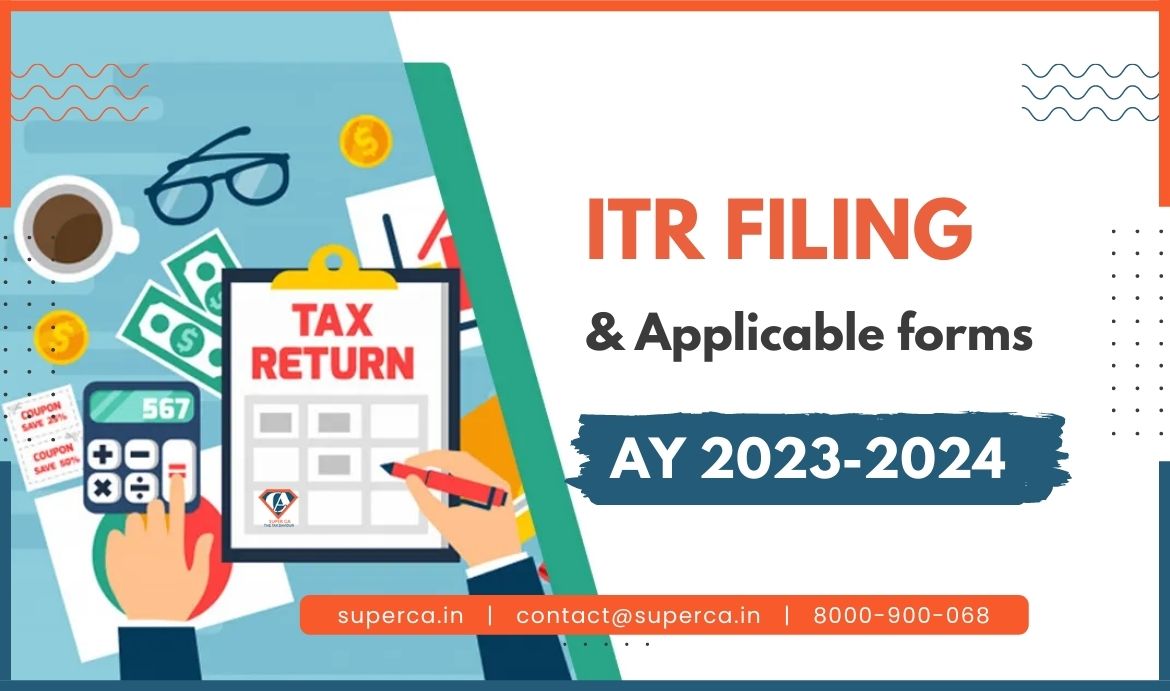
The Income Tax Return (ITR) Filing is a yearly process that individuals and organizations must undertake to report their taxable income to the government and settle their tax obligations. It involves providing details on sources of income, deductions, and taxes paid during the financial year. Based on this information, the tax liability is determined, and any balance must be paid, or excess taxes claimed as a refund. Filing an ITR is mandatory for individuals with taxable income, and it is essential for compliance with Indian tax laws. Failure to comply may result in penalties and legal consequences. Although individuals with income below the threshold limit are not obligated to file a tax return, they may choose to do so voluntarily. The ITR must be submitted to the Income Tax Department of India on or before the due date.
Looking for a reliable and secure expert to help with your ITR filing? Look no further than SuperCA. By selecting our services, you can not only save time and money, but also rest assured that your tax filing process will not be a ‘file it and forget it’ task. Our team of tax professionals carefully examine every tax return that is submitted, providing support throughout the entire process, including preparation, filing, assessment, scrutiny, rectification, and refund.
In this blog, we will discuss the income tax return filing process and the applicable forms in the Assessment Year (AY) 2023-2024.
Who needs to file an income tax return?
Individuals, Hindu Undivided Families (HUFs), companies, firms, and other entities that have earned income during the financial year (FY) 2022-2023 are required to file their tax return for the AY 2023-24. The income earned can be from various sources such as salary, business/profession, capital gains, interest, rental income, etc. Filing ITR is not only a legal obligation but also has several benefits that help individuals and businesses manage their finances and reduce their tax liabilities.
ITR Forms
The Central Board of Direct Taxes (CBDT) has prescribed different income tax return forms for different types of taxpayers. The forms are categorized based on the type of income earned and the type of taxpayer. Here are the different types of income tax return forms applicable for the AY 2023-2024:
ITR-1 (Sahaj)
ITR-1, also known as Sahaj, is applicable for individuals having income from salary, one house property, and other sources such as interest income, etc. The total income should not exceed Rs. 50 lakhs.
ITR-2
ITR-2 is applicable for individuals and HUFs having income from salary, more than one house property, capital gains, foreign assets/income, and income from other sources. The total income should not exceed Rs. 50 lakhs.
ITR-3
ITR-3 is applicable for individuals and HUFs having income from business or profession. This form is also applicable for individuals who have opted for presumptive taxation under section 44ADA or section 44AD. The total income should not exceed Rs. 50 lakhs.
ITR-4 (Sugam)
ITR-4, also known as Sugam, is applicable for individuals, HUFs, and firms (other than LLP) having income from business or profession and opting for presumptive taxation under section 44AD, 44ADA, or 44AE. The total income should not exceed Rs. 50 lakhs.
ITR-5
ITR-5 is applicable for partnership firms, LLPs, Association of Persons (AoPs), Body of Individuals (BoIs), and other entities.
ITR-6
ITR-6 is applicable for companies that are not claiming exemptions under section 11 of the Income Tax Act, 1961.
ITR-7
ITR-7 is applicable for persons, including companies, who are required to furnish a return under section 139(4A), section 139(4B), section 139(4C), or section 139(4D) of the Income Tax Act, 1961.
Filing deadlines
The deadline for filing income tax returns for the AY 2023-2024 is July 31, 2023, for individuals and HUFs who are not required to get their accounts audited. For individuals and HUFs who are required to get their accounts audited, the deadline is October 31, 2023. The deadline for filing income tax returns for companies is September 30, 2023.
Penalties for late filing
If a taxpayer fails to file an income tax return within the due date, then they will be liable to pay a penalty. The penalty amount varies based on the delay in filing the return. For instance, if the income tax return is filed after the due date but before December 31 of the assessment year, the penalty amount will be Rs. 5,000. However, if the return is filed after December 31, the penalty amount will be Rs. 10,000. For small taxpayers with income up to Rs. 5 lakhs, the penalty amount is capped at Rs. 1,000.
To avoid adverse consequences and penalties, taxpayers are advised to file their ITRs within the due date. In case of late filing, they should clear any penalties and aim to file the next ITR within the due date.
Steps to file an ITR
Here are the steps to file an income tax return:
- Collect all the relevant documents such as Form 16 (if you are a salaried employee), Form 16A (if you have earned income from other sources), bank statements, investment proofs, etc.
- Choose the appropriate income tax return form based on your income source and taxpayer category.
- Fill in the required details such as personal information, income details, deductions, etc. Make sure to double-check the information entered to avoid errors.
- Calculate your tax liability and pay any outstanding taxes, if applicable.
- Verify the income tax return using one of the following methods: a) Aadhaar OTP, b) EVC generated through net banking, c) EVC generated through bank account, or d) sending a signed physical copy of ITR-V to the Income Tax Department.
- Submit the income tax return and keep a copy of the acknowledgement for future reference.
Documents Required
● Aadhaar and PAN Details
● Form 16,16A 26AS etc
- Form-16 (TDS certificate from your employer)
- Form-16A (TDS certificate for payments other than salary)
- Form-16B (TDS certificate from property buyer)
- Form-16C (TDS certificate from tenant)
- Form 26AS (consolidated annual tax statement)
- Investment and loan statements
- Bank statements and income details
- Advance tax receipt
- Documents supporting interest income
- Proofs for deductions under sections 80D to 80U (health insurance, education loan, etc.)
- Tax-saving investment proofs
- Having these documents readily available will ensure a smooth and hassle-free e-filing process.
Benefits of filing ITR
There are several benefits of filing Income Tax Returns (ITR) in India, including:
● Legal Compliance: Filing ITR is mandatory for individuals and organizations with taxable income, and it ensures compliance with Indian tax laws. Failure to file may result in penalties and legal consequences.
● Avoidance of penalties: Filing Income Tax Returns before the deadline helps avoid late filing penalties and interest on any outstanding taxes.
● Loan and Credit Card Applications: Filing Income Tax Returns serves as proof of income and helps individuals and businesses apply for loans, credit cards, and other financial products.
● Carry forward of losses: Filing ITR is necessary to carry forward losses incurred in a financial year and offset them against future profits, reducing tax liability.
● Claiming Tax Refunds: Filing Income Tax Returns helps claim tax refunds in case of excess taxes paid in a financial year.
● Record of Financial Transactions: Filing ITR serves as a record of financial transactions and helps in monitoring personal finances and financial planning.
● Avoiding Scrutiny and Notices: Filing Income Tax Returns on time helps avoid scrutiny and notices from the Income Tax Department, reducing the chances of an audit or investigation.
Conclusion
Filing an income tax return is an important part of being a responsible citizen. It helps to ensure compliance with the law and provides several benefits such as access to financial services, faster processing of refunds, and increased transparency. It can seem as a time consuming and laborious task if you do it on your own. However, choosing SuperCA to handle your income tax returns can simplify the entire process, with just a few simple steps. Our team of experienced professionals is available around the clock to provide assistance and ensure that your income tax returns are filed online promptly. Rather than attempting it yourself, why not let our experts take care of it for you?
If you have any questions about the process, our team of skilled business advisors is just a phone call away. We strive to proactively address any concerns you may have to prevent them from arising in the first place.





